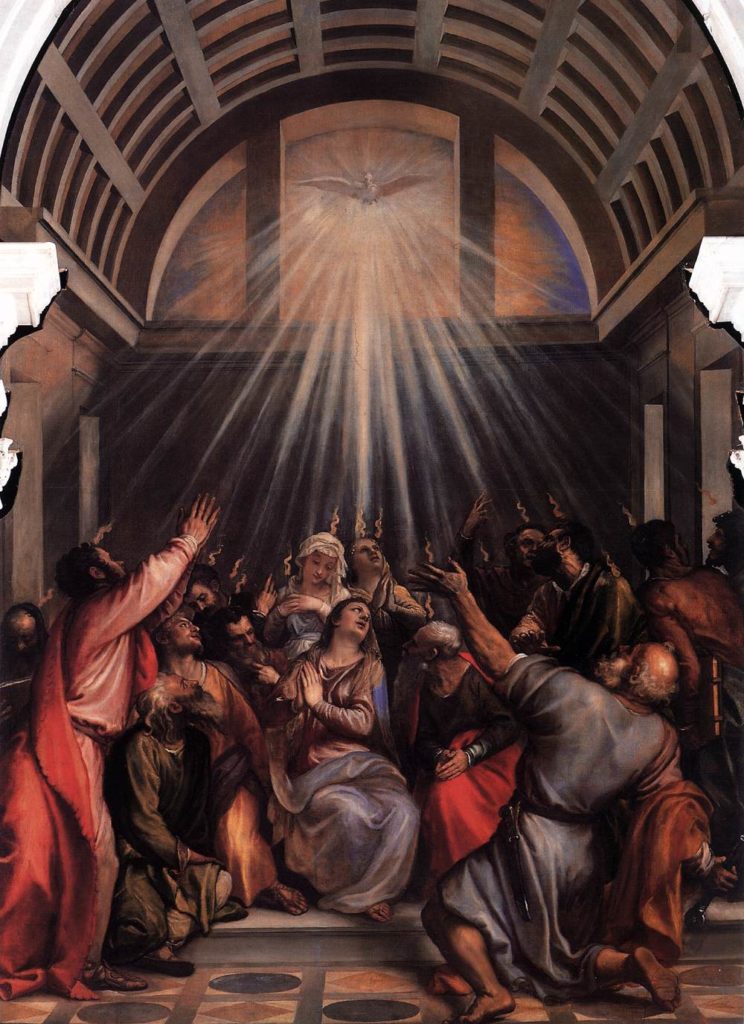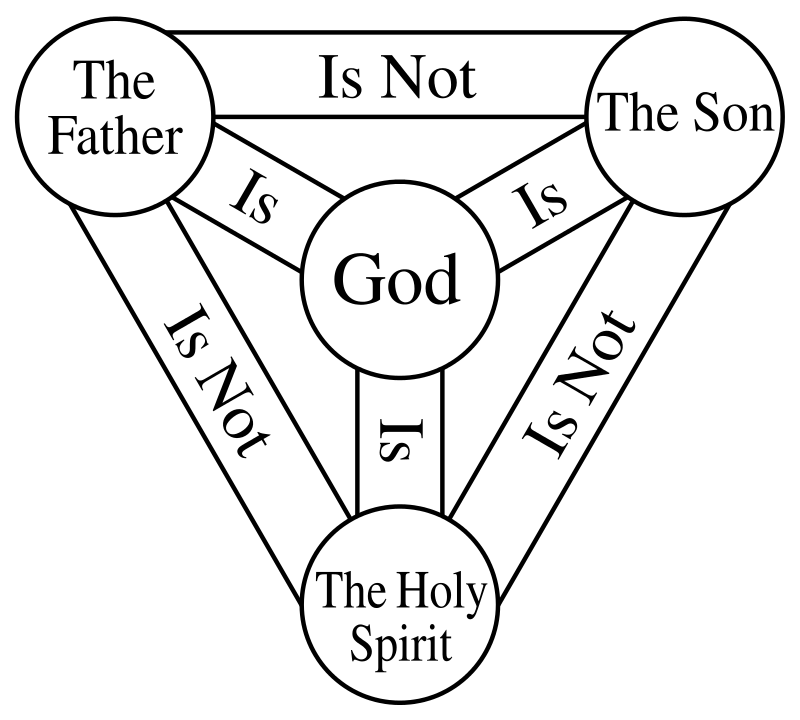The personhood and deity of the Holy Spirit, a survey of his work, and some counterfeits of the Holy Spirit.
Short Answer
According to the Bible, the Holy Spirit is a person and God. He is not an impersonal force, but actively working in the world, in the church, and in the lives of individual Christians. There are many counterfeit spirits in the world, but only one Spirit who is the third member of the Trinity.
Long Answer
There are many misconceptions about the Holy Spirit. Sometimes mistaken for an impersonal force or even a ghost, the Holy Spirit is a real person. Far from the concept of “The Force” in the Star Wars movies, the Holy Spirit is treated as a somebody – not a power – in Scripture. The Holy Spirit teaches (John 14:26), bears witness (Romans 8:16), knows the thoughts of God (1 Cor 2:11) and even forbids some activities (Acts 16:7). No impersonal force can do those things.
In this post, I aim to reveal the personhood and deity of the Holy Spirit, survey his work, and identify counterfeits of the Holy Spirit, and focus on a practical aspect of his ministry.
Personhood of the Holy Spirit
The Holy Spirit is the most misunderstood member of the Christian Trinity. Far from an ‘it’ or a ‘what’, the Holy Spirit is a “he” or a “who” in the pages of Scripture. This may seem like theological nit-picking, but it’s of the utmost importance when it comes to the nature of God. Greek professor Daniel Wallace explains how the New Testament treats the Holy Spirit as a person by using the masculine pronouns. According to Wallace…
“About half a dozen texts in the NT are used in support of the Spirit’s personality on the grounds of gender shift due to constructio ad sensum (“construction according to sense” or, in this case, according to natural as opposed to grammatical gender). That is to say, these passages seem to refer to the Spirit with the masculine gender in spite of the fact that πνεῦμα is neuter, and grammatical concord would normally require that any reference to the Spirit also be in the neuter gender. Such gender shifts are attributed to the fact that the Spirit is a person, and hence the biblical authors naturally speak of him as such, even though this manner of speaking is contrary to normal grammatical convention.”
In this overview, Wallace explains one way the Bible affirms the personhood of the Holy Spirit. Normally, the original language would call the “spirit” (Greek: πνεῦμα) an “it” because it’s a neuter noun. But the New Testament authors go out of their way to refer to the Spirit in masculine pronouns. In other words, they knew the Holy Spirit is more than a thing – he is a person.
Where shall I go from your Spirit? Or where shall I flee from your presence? If I ascend to heaven, you are there! If I make my bed in Sheol, you are there! (Psalm 139:7-8)

The Descent of the Holy Spirit by Titian (1545). Image credit: Wikimedia
Deity of the Holy Spirit
But it’s not enough to understand the Holy Spirit as a person. A person or spirit who does the kinds of things the Holy Spirit does, is no mere spirit. The Bible teaches the Holy Spirit is also God. These are some of the God-like aspects of the Holy Spirit…
- Saves people (John 3:6)
- Power to create (Job 33:4)
- Omnipresence (Psalm 139:7-8)
- Omniscience (1 Corinthians 2:10)
- Luke equates him with God (Acts 5:3-4)
- Paul equates him with God (Ephesians 2:22)
- Active at the creation of the universe (Genesis 1:2)
- The author of Hebrews equates him with God (Hebrews 10:15-17)
- Grouped with the other members of the Trinity (2 Corinthians 13:14)
Like God the Father and God the Son, God the Holy Spirit is a co-equal member of the holy Trinity. All major branches of the Christianity (Protestant, Catholic, Orthodox) affirm the Godhood of the Holy Spirit. To deny the divinity of the Holy Spirit, like some non-Christian cults do, is to deny the clear teaching of the Scripture.
“But Peter said, “Ananias, why has Satan filled your heart to lie to the Holy Spirit and to keep back for yourself part of the proceeds of the land? 4 While it remained unsold, did it not remain your own? And after it was sold, was it not at your disposal? Why is it that you have contrived this deed in your heart? You have not lied to man but to God.” (Acts 5:3-4)


The “Shield of the Trinity” or “Scutum Fidei” diagram in traditional Christian symbolism. Image credit: Wikipedia
Work & Ministry of the Holy Spirit
The Holy Spirit was active at creation and is still active today.
Theologian Wayne Grudem says, “the work of the Holy Spirit is to manifest the active presence of God in the world, and especially in the church.” According to Grudem, there are many present-day ministries and activities of the Holy Spirit. For instance, the Holy Spirit…
- Gives initial life. (Psalm 104:30)
- Grants new life to the unregenerate. (John 3:6-7)
- Empowers believers for service. (Acts 1:8)
- Gives spiritual gifts for special service. (1 Corinthians 12:11)
- Helps believers pray better. (Romans 8:26)
- Casts out demons in oppressed people. (Matthew 12:28)
- Helps distinguish between other spirits. (1 Corinthians 12:10)
- Convicts the world about sin, righteousness, and judgment. (John 16:8)
- Washes and sanctifies God’s people. (1 Corinthians 6:11)
- “Baptizes” people. (Matthew 3:11)
- Produces fruit in the lives of believers. (Galatians 5:22-23)
- Helps us grow in personal holiness. (Romans 8:13)
- Shows himself in various manifestations. (1 Corinthians 14:12)
- Glorifies Jesus. (John 16:14)
- Empowers people to speak in unknown languages or “tongues”. (Acts 2:2-3)
- Bears witness with our spirit that we are children of God. (Romans 8:16)
- Guarantees the Christian’s future redemption. (2 Corinthians 1:22)
- Works miraculous signs to prove God’s word. (1 Corinthians 2:4)
- Guides believers. (Romans 8:14)
- Speaks. (Acts 13:2)
- Pours God’s love into Christians’ hearts. (Romans 5:5)
- Imparts an atmosphere of peace and joy. (Romans 14:17)
- Shows believers they belong to God. (1 John 4:13)
- Teaches. (John 14:26)
- Guides Christians into all truth. (John 16:13)
- Can be grieved. (Ephesians 4:30)
- Can be quenched. (1 Thessalonians 5:19)
- Can be blasphemed – the unpardonable sin. (Mark 3:29)
- Fills believers. (Ephesians 5:18)
- Comforts the church. (Acts 9:31)
This is not an exhaustive list of all the activities of the Holy Spirit, but it’s a good sampling of what the Holy Spirit is currently doing. As Grudem says, he is the “active presence of God in this world” and the Holy Spirit continues his work even now.
“When the Spirit of truth comes, he will guide you into all the truth, for he will not speak on his own authority, but whatever he hears he will speak, and he will declare to you the things that are to come. He will glorify me, for he will take what is mine and declare it to you.” (John 16:13-14)

We understand who the Holy Spirit is from the Bible.
Counterfeits to the Holy Spirit: “Other Spirits”
We live in a spiritual world. Although the Holy Spirit is part of that world – and even created that world – he is not the only spirit to inhabit the spirit-realm.
Other spirits also roam the spirit plain.
The Scriptures instruct us “do not believe every spirit” (1 John 4:1). The passages suggest other spirits will try to delude us through false prophets. But the false prophets are not speaking on their own; they are being inspired by spirits other than the Holy Spirit.
That means we should never immediately accept spiritual insight from a guru if they say they speak for the Holy Spirit. Every teaching must be weighed against the Bible to see whether it is from God.
One of the main points behind John’s first epistle (1 John) was to help believers distinguish between the Holy Spirit and other spirits. For instance, the Holy Spirit, confesses that Jesus Christ came in the flesh (1 John 4:2), is not from the world. (1 John 4:5), and agrees with the Apostles (1 John 4:6). Counterfeit spirits and their false prophet mouthpieces don’t do any of those things.
“Beloved, do not believe every spirit, but test the spirits to see whether they are from God, for many false prophets have gone out into the world.” (1 John 4:1)

“Beloved, do not believe every spirit.” (1 John 1:4)
Practical: The Holy Spirit Empowers Believers To Live The Christian Life
All of these aspects of the Holy Spirit are important. From his personhood, deity and work, to being able to identify some of his counterfeits, each facet is critical to understanding the nature of the Holy Spirit.
One of the more practical aspects of the Holy Spirit is how he empowers Christians to live a holy life. Paul inserted one of the primary secrets to living the Christian life when he wrote, “but I say, walk by the Spirit, and you will not gratify the desires of the flesh.” (Galatians 5:16).
Though it may be a difficult task to master, this seems to be one of the aims of a mature Christian in the New Testament. To connect with the Holy Spirit by “walking” with him is to honor Christ. He is our source of spiritual power to live a life pleasing to the Lord. (John 15:4)
Resources
- Matt Slick: Biblical Overview of The Holy Spirit
- Alistair Begg: Five Truths About The Holy Spirit
- John Piper: How To Seek The Holy Spirit








